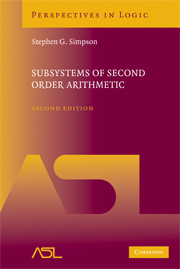CHAPTER 1 - INTRODUCTION
Published online by Cambridge University Press: 19 February 2010
Summary
The Main Question
The purpose of this book is to use the tools of mathematical logic to study certain problems in foundations of mathematics. We are especially interested in the question of which set existence axioms are needed to prove the known theorems of mathematics.
The scope of this initial question is very broad, but we can narrow it down somewhat by dividing mathematics into two parts. On the one hand there is set-theoretic mathematics, and on the other hand there is what we call “non-set-theoretic” or “ordinary” mathematics. By set-theoretic mathematics we mean those branches of mathematics that were created by the set-theoretic revolution which took place approximately a century ago. We have in mind such branches as general topology, abstract functional analysis, the study of uncountable discrete algebraic structures, and of course abstract set theory itself.
We identify as ordinary or non-set-theoretic that body of mathematics which is prior to or independent of the introduction of abstract set-theoretic concepts. We have in mind such branches as geometry, number theory, calculus, differential equations, real and complex analysis, countable algebra, the topology of complete separable metric spaces, mathematical logic, and computability theory.
The distinction between settheoretic and ordinary mathematics corresponds roughly to the distinction between “uncountable mathematics” and “countable mathematics”. This formulation is valid if we stipulate that “countable mathematics” includes the study of possibly uncountable complete separable metric spaces.
- Type
- Chapter
- Information
- Subsystems of Second Order Arithmetic , pp. 1 - 60Publisher: Cambridge University PressPrint publication year: 2009

